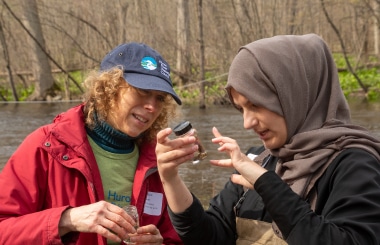We Celebrate our Home Waters with Passion and Dedication

For over 50 years, HRWC has played a vital role in securing statewide and federal legislation that protects water resources including the:
- Inland Lakes and Streams Act
- Clean Water Act and its reauthorization
- Goermare‐Anderson Wetland Protection Act
- Soil Erosion and Sedimentation Control Act
- Michigan Natural Rivers Act
- River Basin Management Act
- Septage Waste Haulers Act
- Michigan Phosphorus Fertilizer Ban
HRWC also played a significant role in having portions of the Huron designated as a Natural River by the State of Michigan in the 1970s.
Other successes include:
- implementing best practices to reduce excessive flows in urban tributaries to the Huron;
- initiating and shaping statewide phosphorus legislation to reduce nuisance algal blooms;
- advancing science and policy on issues such as innovative land use strategies, carrying capacity of creeks, and climate change resiliency for public sectors; and
- spearheading public‐private partnerships to orient communities towards the River, helping to transform the Huron River corridor in to a premier destination.
To further protect the River and its habitats, HRWC has created partnerships with local and regional parks systems, land conservancies, and local governments to provide technical information to prioritize critical lands for acquisition and develop strategies ensuring the long‐term protection of these regions. The result has been the protection of over 10,000 acres in the Watershed.
HRWC coordinates an on‐going effort with 19 partners in the Middle Huron Initiative. Through this Initiative, the partners invested more than $10 million dollars over 11 years to reduce pollution entering the River, to meet the Clean Water Act regulations. The partners also worked with HRWC to develop stronger soil erosion controls for construction projects, enact ordinances to protect shoreline plant buffers, and build Green Infrastructure techniques to hold and infiltrate polluted runoff. 4,700 water samples taken have demonstrated that more than six tons of total phosphorus was kept out of target waterbodies annually.
In 2014, through the Climate Resilient Communities project, HRWC and project participants promoted use of revised storm definitions published by National Oceanic and Atmospheric Administration, which led to stronger county‐level stormwater management regulations.
In 2012, in part because of HRWC’s leadership and advocacy, the State of Michigan implemented a statewide policy restricting phosphorus use, including increased education and information to the public about the impacts of fertilizers with phosphorus on water quality. The legislation has been effective and has resulted in reduced levels of the nutrient in local waters.
HRWC conducted a 2011 survey of watershed residents, which showed remarkable improvements in attitudes over a similar 2004 study, and demonstrated that Watershed residents recognize behaviors that will improve the River and revealed that most are willing to engage in practices to help the River.
In 2008, with HRWC leadership, the first dam was removed from the Huron River system in the Village of Dexter, stimulating a Main Street renaissance in that community. Dexter has reimagined itself as a waterfront community on free‐flowing Mill Creek, the Huron’s largest tributary, connecting downtown to the water through walking trails, public green spaces, and new canoe and kayak access. Dexter’s waterfront revival serves as a successful case study in how to leverage freshwater assets for local economic development and community enhancement.

HRWC has developed the premier citizen river monitoring network with strong quality assurance and quality control mechanisms that allow state and federal agencies to confidently use these data to direct water protection programs and that direct watershed protection projects.
In 2005, HRWC helped launch, and continues to run, the Michigan Clean Water Corps, working alongside the Great Lakes Commission to provide statewide trainings, mentorship, and funding for lake and stream volunteer monitoring programs.
In 2015, HRWC lead the process to gain National Water Trail designation for the Huron River Water Trail, making it the eighteenth designated trail in the country.
From 2014-2017 HRWC successfully worked with ten cities and townships in the watershed to ban toxic coal tar sealcoat products. Currently we are working with state legislators on a statewide ban while continuing to assist local municipalities with banning the substance and implementation of existing bans.
Learn more about our Programs Donate to support our programs



